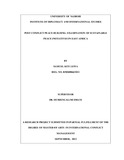| dc.contributor.author | Lewa, Samuel K | |
| dc.date.accessioned | 2013-11-13T09:52:05Z | |
| dc.date.available | 2013-11-13T09:52:05Z | |
| dc.date.issued | 2013-09 | |
| dc.identifier.citation | Degree of Master of Arts in International Conflict | en |
| dc.identifier.uri | http://erepository.uonbi.ac.ke:8080/xmlui/handle/123456789/58871 | |
| dc.description | A research project submitted in partial fulfillment of the
Degree of Master of Arts in International Conflict | en |
| dc.description.abstract | This study investigated post conflict peace building initiatives in East Africa. It explored
to find out whether peace building initiatives in East Africa have been successful or not
and whether there is sustainable peace. Since post conflict societies are plagued with
various issues such as immediate humanitarian assistance, reconstruction and
rehabilitation, the study navigated through these issues with a bid to appreciating them
and exert peace building approaches to negate them. The objectives of the study were to
examine the sustainable peace initiatives amongst post conflict societies in East Africa.
The study specifically undertook to analyze the strategies used in bringing about
sustainable peace in the East African Community. It finally zeroed down to explore
reconstruction and recovery strategies in post conflict peace building in a bid to clearly
bring out which one is commendable within the East African Community. The case study
was post election violence of 2007 /08 in Kenya. The research hypothesizes that post
conflict peace building initiatives in East Africa are sustainable and effective even though
they are reconstruction oriented rather than recovery oriented. The study also assumed
that post conflict peace building initiatives in East Africa are not sustainable and are
ineffective because they are reconstruction oriented rather than recovery oriented. Finally
the study hypothesizes that post conflict peace building initiatives in East Africa are
neither affected by reconstruction nor recovery strategies. In pursuit of these objectives
and hypothesis, the study adopted a methodology with three component tools of analysis.
The first was primary and secondary data analysis. This involved a critical review of both
published and unpublished materials on post conflict peace building initiatives in East
Africa. The instruments employed in this case were within case analysis and cross case
analysis. The second component involved use of questionnaires and interviews with
various members from the East African countries and other key informants. The third
methodological component was focused group discussions with select participants on the
basis of their knowledge and expertise. The study employed the qualitative aspects of
research procedures and used narratives in explaining its findings. The study found out
that peace building initiatives in East Africa are not sustainable and are ineffective
because they are reconstruction oriented rather than recovery oriented. The study,
therefore rejected the assumption that post conflict peace building initiatives in East
Africa are sustainable even though they are reconstruction oriented rather than recovery
oriented. It further rejected the assumption that post conflict peace building initiatives in
East Africa are neither affected by reconstruction nor recovery strategies. In concluding,
the study fully examined the peace initiatives in East Africa and revealed that peace
initiatives are not sustainable. The East African Community is living on viable peace
rather than sustainable peace. The member states in the EAC still adhere to state
sovereignty and efforts to foster the East African Federation are more of blueprint rather
than practical. | en |
| dc.language.iso | en | en |
| dc.publisher | University of Nairobi | en |
| dc.title | Post Conflict Peace Building: Examination of Sustainable Peace Initiatives in East Africa | en |
| dc.type | Thesis | en |
| local.publisher | Institute of Diplomacy and International Studies | en |

